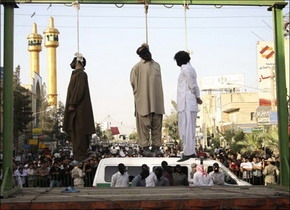Iran’s Worsening Treatment Of Religious Minorities
أسوأ معاملة إيرانية للأقليات الدينية
Dr. Majid Rafizadeh/Arab News/February 05/2018
The Iranian regime boasts about respecting religious freedom and being tolerant towards religious minorities, and President Hassan Rouhani has frequently promised them equal rights. Nevertheless, reports from human rights organizations such as Amnesty International reveal a different story. The rights of the Iranian people to enjoy religious freedom continue to be violated and many are facing systematic persecution and discrimination on a daily basis.
One specific example of the ongoing harassment and persecution by the Iranian authorities is linked to the regime’s targeting of Sunni religious leaders. Sunnis constitute the largest religious minority — roughly 5 to 10 percent of the population — in the Shiite-majority nation.
Molavi Abdolhamid Ismaeelzahi is considered Iran’s highest-ranking Muslim Sunni cleric and is regarded as a “spiritual leader for Iran’s Sunni minority.” He is the head of the council of Sunni religious schools in the Sistan and Baluchestan Province and is a member of the International Union of Muslim Scholars. The Iranian regime has intensified its harassment of Ismaeelzahi. He has attempted to find a middle ground with Iran’s ruling Shiite clerics, but his attempts have failed.
The Iranian regime targets leaders of religious minorities in a shrewd attempt to impose fear collectively from the top of the group, in order to restrict the activities of its members.
Ismaeelzahi is facing an “ongoing climate of intimidation and fear” and the regime has barred him from traveling within the country, let alone abroad. In a recent interview with the Center for Human Rights in Iran, he pointed out: “We know that if we don’t ask for permission before we travel, the authorities will create problems for us.” He highlights the complexities of the issue by adding: “We understand the situation and the pressures that exist. So we have decided to coordinate our plans with the authorities. We wanted to go to Mashhad but they didn’t allow it. We said thousands of people go to Mashhad every day. They said those people are different because, if I go to Mashhad, the people will come to see me. Then we wanted to go to Kerman and we talked about it with the authorities, but they didn’t give us permission.”
The country’s Sunni population and its religious leaders are viewed through a prism of suspicion and are regarded as an opposition group, or even as outsiders though their homeland is Iran.
From the perspective of the Iranian regime, the country’s Sunni minority and religious leaders are viewed through a prism of suspicion and are regarded as an opposition group, or even as outsiders though their homeland is Iran.























